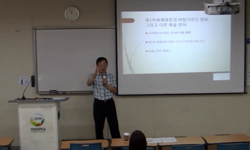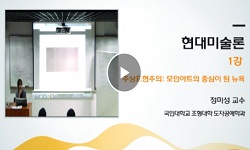This article aims to illuminate the plays of the German playwright Peter Weiss in light of the age of the ‘60s’ in celebration of the 50th anniversary of the ‘68 movement’. The ‘68 Movement’ is a political and social movement aimed at revo...
http://chineseinput.net/에서 pinyin(병음)방식으로 중국어를 변환할 수 있습니다.
변환된 중국어를 복사하여 사용하시면 됩니다.
- 中文 을 입력하시려면 zhongwen을 입력하시고 space를누르시면됩니다.
- 北京 을 입력하시려면 beijing을 입력하시고 space를 누르시면 됩니다.
https://www.riss.kr/link?id=A105908753
-
저자
김겸섭 (경상대학교)
- 발행기관
- 학술지명
- 권호사항
-
발행연도
2018
-
작성언어
Korean
-
주제어
Peter Weiss ; 68 movement. Avantgarde ; democratic socialism ; alternative theater ; real socialism ; Kommune ; 페터 바이스 ; 68운동 ; 아방가르드 ; 민주적 사회주의 ; 대안연극 ; 현실사회주의 ; 코뮨
-
등재정보
KCI등재
-
자료형태
학술저널
-
수록면
65-94(30쪽)
-
KCI 피인용횟수
0
- 제공처
-
0
상세조회 -
0
다운로드
부가정보
다국어 초록 (Multilingual Abstract)

Peter Weiss has a great interest in alternative theatrical experiments, which he sympathizes with the ideas and ideals of the 68 movement. Especially, the cultural orientation of the avant-garde theater and political theater in the sixties towards the coordination and solidarity leaves a distinct imprint on Weiss’s persistent efforts to find the ideological coordinates of artistic alternatives and social changes. The artistic novelty and radicality of the dramatic form, and the multi-layered polyphony of the dramatic structure coincide with the direction of the 68 movement that pursued the unification of ‘resistance’ and ‘aesthetics’. In the context of the ‘60s’ efforts to read can gain legitimacy. In this sense, the attempt of this thesis to read Weiss’ 3 plays in the context of the ‘60s’ can gain legitimacy.
This paper attempts to derive the problem of intellectuals and power in the era of radical reformation through the dialogues of characters in Peter Weis’ midterm theaters. Through the conversations of these intellectuals-artists who actually participated in the revolution, we can discover the lessons that the idea of the 68 movement gives us in ‘now and here’.
This article aims to illuminate the plays of the German playwright Peter Weiss in light of the age of the ‘60s’ in celebration of the 50th anniversary of the ‘68 movement’. The ‘68 Movement’ is a political and social movement aimed at revolution of consciousness. In many capitalist countries, struggles against dictatorships, state repression, and colonization were also marked by protests in 1968, in the socialist countries there were also protests against lack of freedom of speech and violation of other civil rights by the Communist bureaucratic and military elites.
Peter Weiss has a great interest in alternative theatrical experiments, which he sympathizes with the ideas and ideals of the 68 movement. Especially, the cultural orientation of the avant-garde theater and political theater in the sixties towards the coordination and solidarity leaves a distinct imprint on Weiss’s persistent efforts to find the ideological coordinates of artistic alternatives and social changes. The artistic novelty and radicality of the dramatic form, and the multi-layered polyphony of the dramatic structure coincide with the direction of the 68 movement that pursued the unification of ‘resistance’ and ‘aesthetics’. In the context of the ‘60s’ efforts to read can gain legitimacy. In this sense, the attempt of this thesis to read Weiss’ 3 plays in the context of the ‘60s’ can gain legitimacy.
This paper attempts to derive the problem of intellectuals and power in the era of radical reformation through the dialogues of characters in Peter Weis’ midterm theaters. Through the conversations of these intellectuals-artists who actually participated in the revolution, we can discover the lessons that the idea of the 68 movement gives us in ‘now and here’.
참고문헌 (Reference)
1 Strue Packalén, "Zukunftshoffnung in der Vergangenheit. Peter Weiss’' Hölderlin im Spiegel der Kritik in Ost und West" 1991
2 Herbert Marcuse, "Triebstruktur und Gesellschaft" 1979
3 Peter Weiss, "StückeⅡ" 1977
4 Peter Weiss, "StückeⅠ" 1976
5 Peter Weiss, "Rekonvaleszenz" 1991
6 Robert Cohen, "Peter Weiss In Seiner Zeit" 1992
7 Arnd Beise, "Peter Weiss" 2002
8 Peter Weiss, "Notizbücher 1971-1980" 1981
9 Peter Weiss, "Notizbücher 1960-1971" 1982
10 Ingrid Gilcher-Holtey, "Die 68er Bewegung. Deutschland-Westeuropa- USA" 2001
1 Strue Packalén, "Zukunftshoffnung in der Vergangenheit. Peter Weiss’' Hölderlin im Spiegel der Kritik in Ost und West" 1991
2 Herbert Marcuse, "Triebstruktur und Gesellschaft" 1979
3 Peter Weiss, "StückeⅡ" 1977
4 Peter Weiss, "StückeⅠ" 1976
5 Peter Weiss, "Rekonvaleszenz" 1991
6 Robert Cohen, "Peter Weiss In Seiner Zeit" 1992
7 Arnd Beise, "Peter Weiss" 2002
8 Peter Weiss, "Notizbücher 1971-1980" 1981
9 Peter Weiss, "Notizbücher 1960-1971" 1982
10 Ingrid Gilcher-Holtey, "Die 68er Bewegung. Deutschland-Westeuropa- USA" 2001
11 Herbert Marcuse, "Der eindimensionale Mensch" 1967
12 Manfred Haiduk, "Der Dramatiker Peter Weiss" 1977
13 Jürgen Grimm, "Das avantgardische Theater Frankreichs 1895-1930" 1978
14 김겸섭, "68혁명과 현실부정의 연극 - 페터 한트케의『횔덜린』을 중심으로" 한국뷔히너학회 (25) : 47-74, 2005
15 Nobert Frei, "1968, München"
동일학술지(권/호) 다른 논문
-
- 한국문화융합학회
- 박윤영
- 2018
- KCI등재
-
임상실습 중 간호대학생이 경험한 병원 내 폭력, 간호사의 무례함이 진로정체감에 미치는 영향
- 한국문화융합학회
- 이지영
- 2018
- KCI등재
-
한국 현대사 정치문화에 대한 고찰:쿠데타군의 재집권시기를 중심으로
- 한국문화융합학회
- 임선우
- 2018
- KCI등재
-
수학 대중화를 위한 정부의 역할과 정책 방향- 수학문화 인식에 대한 개선방안을 중심으로
- 한국문화융합학회
- 한상연
- 2018
- KCI등재
분석정보
인용정보 인용지수 설명보기
학술지 이력
| 연월일 | 이력구분 | 이력상세 | 등재구분 |
|---|---|---|---|
| 2026 | 평가예정 | 재인증평가 신청대상 (재인증) | |
| 2022-03-24 | 학술지명변경 | 한글명 : 문화와 융합 -> 문화와융합 |  |
| 2022-03-16 | 학회명변경 | 영문명 : The Korean Society of Culture and Convergence -> The Society of Korean Culture and Convergence |  |
| 2020-01-01 | 평가 | 등재학술지 유지 (재인증) |  |
| 2017-01-01 | 평가 | 등재학술지 선정 (계속평가) |  |
| 2015-01-01 | 평가 | 등재후보학술지 선정 (신규평가) |  |
| 2014-03-04 | 학회명변경 | 한글명 : 문학과언어학회 -> 한국문화융합학회영문명 : Munhak Kwa Eoneo Hakhoi -> The Korean Society of Culture and Convergence |
학술지 인용정보
| 기준연도 | WOS-KCI 통합IF(2년) | KCIF(2년) | KCIF(3년) |
|---|---|---|---|
| 2016 | 0 | 0 | 0 |
| KCIF(4년) | KCIF(5년) | 중심성지수(3년) | 즉시성지수 |
| 0 | 0 | 0 | 0.13 |




 KCI
KCI





